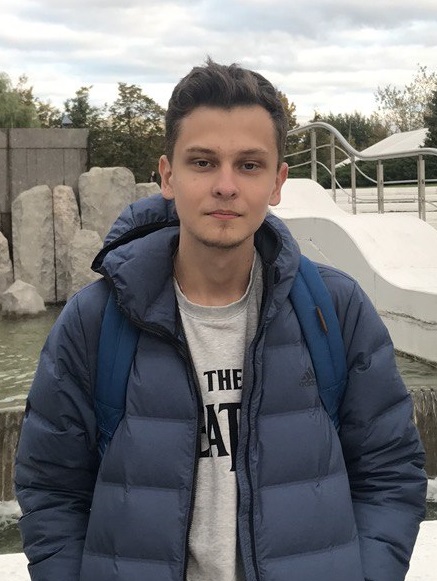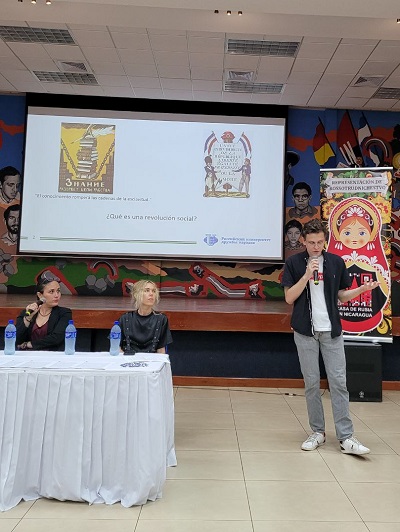Living in Latin America for 6 years, travelling around Europe, and dreaming of teaching Russian history: Alexander Vorobyov, student at RUDN University

When did you realize that you wanted to become a historian?
As a child, my grandmother bought me historical encyclopedias, and I read a little. And in 4th grade we had a subject “The World around us”. There I learned about the Patriotic War of 1812. I was so interested that, probably, it was then that I realized that I wanted to become a historian. Then my mother bought me a game “Napoleon total war” — a strategy about the Napoleonic wars. My desire to study history became even stronger.
You studied history as an undergraduate and went on to graduate in the same field. For what?
We have excellent teachers in the departments of Russian history and world history. For 4 years, my scientific advisor, Marina Moseikina, and I worked on the topic of the leftist movement in Russia in the 1990s. I want to develop this research further in my master’s degree. We also have an excellent team: it’s a pleasure to study and spend free time with classmates. Therefore, I didn’t think long and immediately chose a master’s degree in history at RUDN University.
What do historians do?
Some work as teachers in schools, some as lecturers at universities. There are analysts, journalists, writers, some even go into politics. I am skeptical about the latter profession. It seems to me that it is better for a researcher to study phenomena and processes, rather than deal with the situation.
How often do you travel?
My dad is a diplomat. From 4 to 7 years old I lived in Peru, from 13 to 16 in Argentina. I went to kindergarten in Peru. It was interesting there, I made friends with local children. I remember the capital Lima, the Pacific Ocean. I remember Argentina much better. We visited the west of the country and the province of Cordoba. I remember the house-museum of Ernesto Che Guevara, where he lived as a child. Iguazu Falls in the north of the country is a beautiful place. The city of Carilo on the Atlantic coast is called “the local Switzerland”. Our family also traveled to France, Italy, Spain, the Netherlands, Montenegro, Croatia, Bosnia and Herzegovina. When I returned from Argentina in 2019, I traveled a lot around Russia.
Which countries would you like to return to?
I really liked Italy. I was there when I was 11 years old, when I actively played Assassin’s Creed 2. The main events of the game take place in Venice and Florence at the end of the 15th century. Therefore, when we went on an excursion to these cities, I already knew in advance where the Palazzo Medici or Santa Maria del Fiore were located. Playing computer games is sometimes very educative! Probably, it is Italy that I want to return to. I would also like to go to Spain — I have a friend who lives there, whom I have not seen for 6 years. And of course, I always want to return to Latin America. After living there for about 6 years, I became very attached to this country. I am planning to visit a new country — for example, Mexico.
How did you end up in Nicaragua?
Мой отец работает в посольстве Российской Федерации в Никарагуа. Я очень хотел прилететь к нему прошлым летом, но не получилось. Поездка этим летом тоже находилась на грани срыва — билеты стоили очень дорого. В апреле я уже готов был перенести все на следующий год. Однако в мае цены резко снизились, и 4 июля я улетел.
What places have you visited?
I visited old cities founded in the 16th century: Granada and Leon. I saw the largest cathedral in Central America, which is located in Leon. I looked at the active Masaya volcano. There I met a Colombian who graduated from RUDN University in 1982. I went to the largest lake in Central America — Nicaragua. 5 thousand years ago it was part of the Pacific Ocean, separated due to the shift of tectonic plates, and sharks are still found there. I also flew to the Caribbean, to Corn Island, where I was able to communicate with the local Miskito Indians, see the churches of the Moravian Brethren, Baptists, Catholics, Adventists, and Anglicans. It was very exciting!

Your vacation in Nicaragua was more than just relaxation—you also had time to work
I talked with diplomats from the Russian embassy and other Russian institutions. It was especially pleasant to meet the Head of the training center of the Ministry of Internal Affairs in Nicaragua, Oleg Surov. This is the only training center of the Ministry of Internal Affairs abroad. Basically, the teachers there teach Nicaraguan police officers how to combat drug trafficking. In August, I received permission to speak at one of the major educational institutions in Nicaragua — the National Autonomous University.
You gave a lecture “The Social Revolutions of 1917 and 1979: Russia and Nicaragua”. Why did you choose such a topic?
I study left, anti-capitalist political parties and social. I am interested in the phenomenon of social revolutions and the radical changes they bring. I thought it was important to compare the October Revolution in Russia in 1917 and the Sandinista Revolution in Nicaragua in 1979.
What conclusions can be drawn from the history of the revolution in Nicaragua?
We should pay more attention to countries on the “periphery of the capitalist system.” I am not saying we should stop studying the West; very interesting processes are indeed taking place there, but I believe that we need to pay attention to Asia, Africa, and Latin America.
What questions and comments from the meeting participants were particularly interesting?What questions and comments from the meeting participants were particularly interesting?
There were many questions: how the USSR helped Nicaragua in the 1980s, how to compare the revolutions in Cuba and Nicaragua. However, the most interesting question came from a local university student. She asked whether the 1917 revolution had a religious connotation. I remembered a fragment from Platonov’s work. After the revolution of 1917, the peasants of one of the villages in Central Russia decided that since the revolution had happened, there would be no more death. But when an old peasant died in the village, they became very disappointed. So, in a sense, there was something religious about the revolution.
What is your professional dream??
I would like to become a teacher, educate people, contribute to science with my research, write a PhD and doctoral dissertation.
RUDN University staff and alumni received state and departmental awards at the State Kremlin Palace during a festive concert in honor of RUDN 65th anniversary.
An architectural-landscape project by a 5th-year student of RUDN has been shortlisted for the annual International Professional ADD AWARDS 2024 for architects, designers, and developers in the “Urban Environment” category.
RUDN University employees’ work and contribution to the development of the university cannot go unappreciated. The Ministry of Science and Higher Education of Russia recognizes talented university employees and present them with various departmental and state awards.
